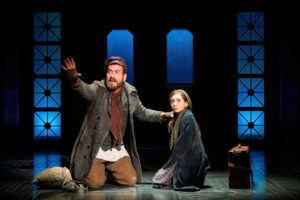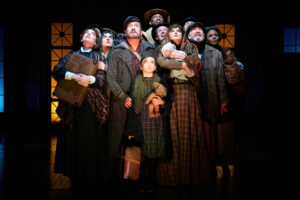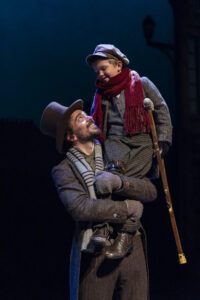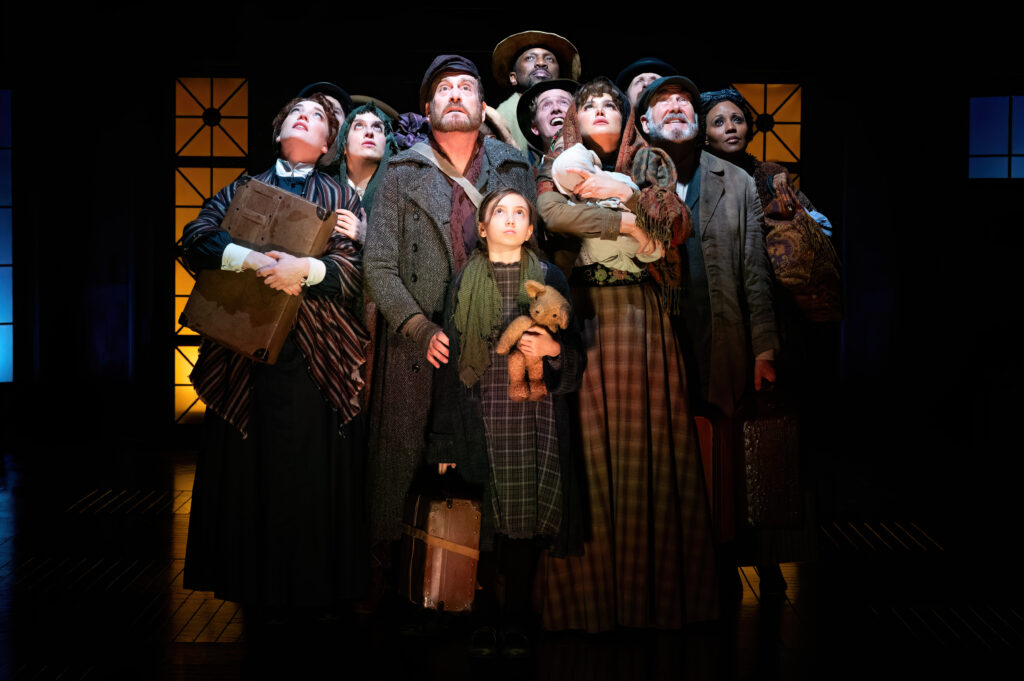What’s it like being a child actor in the DMV, or having one in your family? What about having one join you from rehearsal to stage if you’re a director or actor? We asked local young actors, their families and their adult professional counterparts to find out for ourselves.
Sibling Perspectives

If you love the theater yourself, having a sibling involved can be a great boon. Daniella Ignacio, a local theater artist, writer and musician, shared the story of her brother, who was a professional actor on Broadway when they were children. Having a family member with a professional commitment involving the strict and unusual timeline of a theatrical production is always a disruption to family life, which becomes a full restructuring when said family member can’t drive, or even travel alone. For Daniella, this had wonderful by-products. As a performer herself, immersing herself in the theater as a youth helped shape her into the artist she is today, particularly thanks to the welcoming environment created by the adult professionals her brother worked with.
But not every sibling will be a theater artist. In talking with Kimberly and David Vargo, the parents of 13-year-old actor Elizabeth Vargo, it became clear that it’s OK if a young actor’s professional endeavors require a large investment of parental time and energy, so long as their parents commit to making that same level of investment in all their children. Elizabeth’s sisters, one an equestrian and one a gymnast, also have their passions that require a lot of work to make happen, but with the guiding philosophy of the parents’ ultimate goal being to help all their children reach their dreams, support can be shared equitably, leaving no child feeling as though they are lesser.
Parent Perspectives

For parents, having their child be a pro actor is a rewarding labor of love. From finding auditions, providing transportation, supporting them through the thrills of performances to the sorrows of rejection and more, no part of a child’s professional theater experience happens without their parents. This doesn’t mean a parent can’t be too involved – part of supporting a young theater professional is knowing when to take the lead and when to be a safety net. One must trust their child’s talents and the leadership of the production to best serve the show’s needs. It can be a tricky balance to strike at times – after having had a hand in every stage of auditions, it’s hard to stay in the lobby for rehearsals. But one thing universally agreed upon is that the effort is ultimately worth it. The pride of seeing your child perform as the equal of actors with decades of experience at some of the most prestigious theaters in the country is a feeling unmatched.
Professional Perspectives
Working with young actors is a uniquely rewarding challenge. There is extra friction when integrating a child actor, between the added complications of schoolwork, more limited life experience and the troubles of growing up. But young minds bring new life to classic productions, while conducting themselves with professional maturity far beyond their years. Beyond that, Matthew Gardiner, artistic director of Signature Theatre, discussed how working with children helps keep the stage’s magic alive: “As adults, we can be cynical, we’re at times over it, at times it’s just a job, and to be in a room with young people who still have so much wonder and amazement about this art form reinvigorates that [wonder] in you.”
Similar sentiments were echoed by Johnathan Atkinson, a local actor who has performed on stage with many young actors, including as Bob Crachit in Ford’s Theatre’s annual production of A Christmas Carol. While you do have to be on your best behavior to set a good example for the children as a fellow actor, he said that he often learns from his young costars: “There’s no reason to think that this [young actor] knows less than I do, specifically in terms of theater because … as actors I find we can sometimes take ourselves very seriously, but when we really get down to it, we’re just playing pretend, and the people who do that best are kids.”
The Young Actor’s Experience
 The passion of the young actors Washington Parent interviewed was awe-inspiring. Riglee Ruth Bryson, a 12-year-old actor in North Virginia, discussed how she feels acting has helped her discover aspects of herself she had not known before. “I’ve learned a lot from doing … auditions” Riglee said, “Because I’m like oh! I relate to that so! much! … And if I bring my own twist or vibe to it, it’ll feel like myself and the [character], because they’re so much like me!”
The passion of the young actors Washington Parent interviewed was awe-inspiring. Riglee Ruth Bryson, a 12-year-old actor in North Virginia, discussed how she feels acting has helped her discover aspects of herself she had not known before. “I’ve learned a lot from doing … auditions” Riglee said, “Because I’m like oh! I relate to that so! much! … And if I bring my own twist or vibe to it, it’ll feel like myself and the [character], because they’re so much like me!”
The rewards of the experience stretch beyond even the professional experience and joy of the arts, reaching into the construction of many life skills young actors carry going forward. The demands of theater, both in terms of commitment and professionalism, helps young actors develop skills that others their age don’t always have. Communication skills, conflict resolution and discipline all came up as things learned working in theater, the last one especially. To keep up with a full-time school schedule and the commitments of a show requires a sense of responsibility that many kids won’t achieve until they go off to college or later.
Kurt Boehm, artistic director of Adventure Theatre MTC, shared his go-to example of the ways theatrical skills can carry over into other careers, saying “There [are] so many actors now that work in real estate, which is a very challenging business, but it translates really well because you have to have a strong personality, you have to have business skills …” all things that develop naturally from time spent as a professional actor. In tandem, it helps young artists build a community, which is especially important, as Boehm noted, in the wake of the pandemic lockdown, which isolated fledgling performing artists from others like themselves.
The rewards are far from just internal, however.
Every actor interviewed, child and adult, spoke on the joys of making connections, but particularly moving was a quote from Elizabeth Vargo, who, when asked about her favorite part of the work, said, “It’s the community! I get to be around people who love what I love. Yes, being on stage is amazing, but being able to make these connections with people who have probably a lot more experience than I do … and being in the rehearsal space, piecing it together, seeing it all come together … it’s all an amazing experience, I wouldn’t trade it for the world!”
Ultimately, that’s what it’s about. Young actors serve an important role in the ecosystem of theater, allowing for authentic portrayals of younger characters, but their true purpose is one far more magical. When they take the stage, child actors fuel the collective imagination at the theater’s heart and help invigorate the medium for many years, and performances, yet to come.
Liam McCrickard holds a B.A. in creative and professional writing from Goucher College. He currently serves as assistant editor at Washington Parent. He also works as a freelance designer, writer and editor of tabletop role-playing games.

